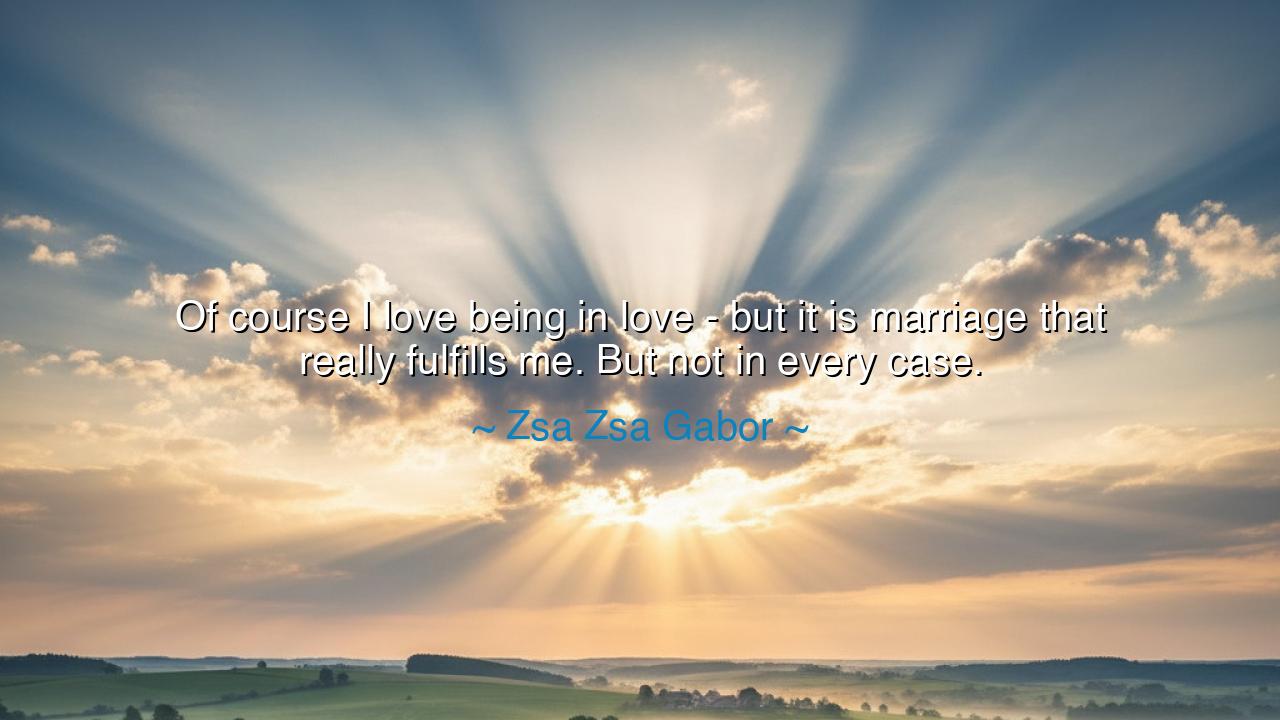
Of course I love being in love - but it is marriage that really
Of course I love being in love - but it is marriage that really fulfills me. But not in every case.






When Zsa Zsa Gabor declared, “Of course I love being in love – but it is marriage that really fulfills me. But not in every case,” she spoke with both delight and caution, weaving together joy and sorrow, wisdom and warning. These words are not merely the musings of a glamorous star, but the testimony of one who had journeyed through love’s fiery trials and tasted both its sweetness and its bitterness. Her confession tells us that love, in its earliest form, is a flame—bright, intoxicating, and wild. Yet, it is marriage that transforms the flame into a hearth, steady and sustaining. But, she warns, this is not so in every case—for even the hearth may turn to ashes if not tended with care.
The meaning of this quote is layered like the folds of an ancient scroll. To be in love is to be carried by the winds of passion, to feel one’s heart leap like a deer across the fields of youth. It is the intoxication of discovery, the thrill of another soul meeting yours beneath the stars. Yet passion alone is fleeting, as the morning dew vanishes beneath the sun. It is marriage, the covenant, the bond sealed by promise and endurance, that fulfills a deeper hunger within the human spirit. Marriage is not simply love’s fever—it is love’s discipline, its wisdom, its patient endurance.
But Gabor’s words carry a shadow of irony, for she herself knew the fragility of unions. Married nine times, she tasted the splendor and the sorrow of many bonds. Thus, her truth comes not from idealized dreams, but from the battlefield of real experience. She reminds us that though marriage can be fulfillment, it may also bring discord and disappointment if entered lightly. Not all loves are meant to be bound for eternity, and not all marriages bear the fruit of peace.
Let us recall the ancient tale of Marcus Aurelius and Faustina the Younger. The Roman emperor, known for his stoic wisdom, was bound to Faustina in marriage, and though the empire whispered rumors of her infidelity, Aurelius never ceased to honor her publicly. Their union, though troubled, endured through storms. It was not passion alone that bound them, but duty, respect, and the weaving of lives into something greater than the sum of its parts. From this we see that marriage, even when imperfect, may shape a soul toward endurance, patience, and growth. Yet we also see that such a bond requires sacrifice, and sacrifice is not always sweet.
The origin of Gabor’s words lies in the dual nature of her own life—she lived in the radiance of love’s theater, yet bore the scars of broken vows. Her laughter was sparkling, but her wisdom hard-won. She could revel in love’s delight, yet still long for marriage’s stability. She could praise marriage, but admit that fulfillment is not promised in every case. Her honesty carries the fragrance of truth: love and marriage are not guarantees of happiness, but opportunities for it, if tended with devotion.
Thus, the lesson is this: seek not only the thrill of being in love, but the deeper purpose of a true union. Love is the seed, but marriage is the garden. And yet, do not enter the garden lightly, for weeds may choke the roots if one plants without care. Choose your soil wisely, nurture it daily, and understand that fulfillment comes not from romance alone, but from shared purpose, sacrifice, and the slow growth of trust.
To the reader, the call is clear: when you love, rejoice in it, but do not cling to passion’s fire alone. Ask yourself: Can this love be built into a life? Does this union bring not only joy but strength? Am I willing to endure the winters as well as the springs? These questions must be asked, for marriage is not only the crown of love but also its crucible.
Finally, remember this truth: love intoxicates, but marriage refines. Do not chase the spark alone; seek also the steady flame. But know, as Gabor herself confessed, that not every bond will bring fulfillment. Learn from both triumph and heartbreak, for each carries wisdom. Live with open eyes, love with a brave heart, and enter marriage not as a dreamer alone, but as a builder of life’s enduring temple.






AAdministratorAdministrator
Welcome, honored guests. Please leave a comment, we will respond soon